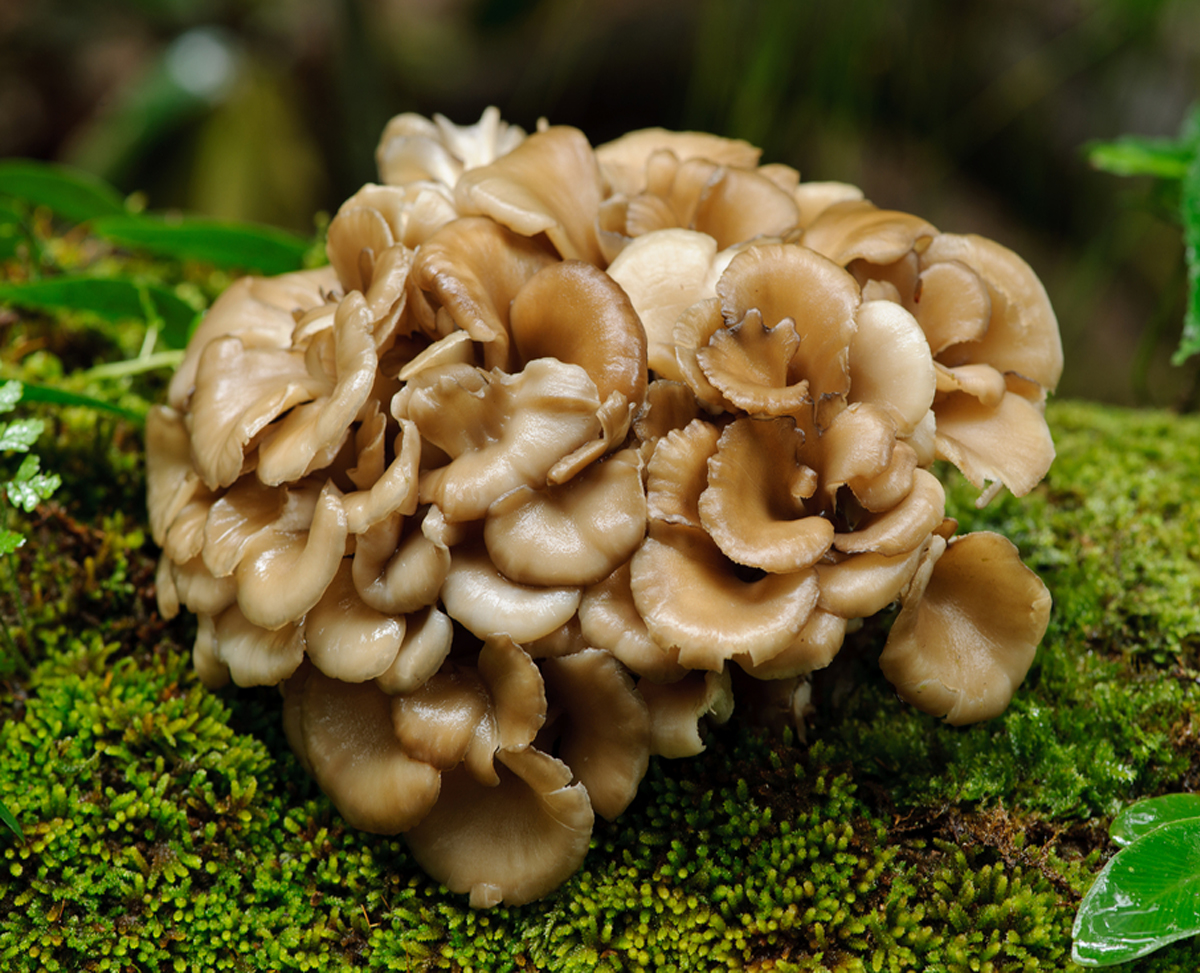This particularly chilly and wet winter presses on, and along with it, cold and flu season. According to the CDC (Centers for Disease Control and Prevention), this year’s flu season is expected to continue for several more weeks, probably well into March!
What can we do to stay healthy?
Continue the same common-sense practices we were taught as children: Wash your hands regularly, avoid close contact with people who are sick, avoid touching your face, (especially your eyes, nose, and mouth), and eat mushrooms. Yes, eat mushrooms!
Fantastical Fungi
In Chinese medicine, the medicinal use of mushrooms dates back to about 200 AD, recorded in the earliest medical texts such as the great classic herbal text, Shen Nong Ben Cao Jing. Mushrooms have always been relished by the Chinese for both their flavor and their curative properties. For example, since ancient times, the reishi mushroom was considered an “elixir of life” and used in soups, teas, and extracts.
Today, mushrooms have come into the spotlight as the latest superfood trend. Scientific research and studies are discovering the many powerful health benefits of mushrooms:
Strengthen the immune system
Fight cancer
Increase antioxidant activity
Manage blood sugar levels
Support brain health
Protect heart health
Improve energy
There are some 270 species of mushroom that are believed to have various therapeutic effects. Approximately 100 species are currently being researched for their medicinal properties. Each mushroom is unique and provides its own distinct health benefits. Today, let’s get to know the top 5 that will assist your immune system in warding off those lurking cold and flu bugs.
Top 5 Mushrooms to boost your immune system:
1. REISHI (ling zhi • ganoderma lucidum)
Reishi mushrooms are full of antioxidants and anti-inflammatory compounds. Studies have shown that Reishi mushrooms have the ability to fight inflammation, cancer, allergies, hormonal imbalances, heart disease, neuro-degenerative problems, and mood disorders.
Its immune enhancing function comes from its high concentration of polysaccharides and triterpenes. Polysaccharides activate macrophages, NK cells, and T-cells (key players in our immune system), offering protection against cancer cells, as well as viral, bacterial, and fungal infections. Triterpenoids protect the liver, lower lipid, and have antioxidant and anti-inflammatory properties. Reishi is also believed to have immunomodulatory properties to inhibit the release of histamine, calming the immune system when in a state of allergic reaction.
2. SHIITAKE (lentinula edodes)
Shiitake mushrooms are considered both a culinary delicacy and a medicinal mushroom. They provide an excellent food source of B vitamins, vitamin D, and zinc and contain all eight essential amino acids. Shiitakes have been found to help fight cancer, boost immunity, and support heart health.
Its immune enhancing function comes from oxalic acid, lentinan, centinamycins A and B and eritadenine, which have antibacterial, antiviral and antifungal effects. In addition, shiitakes contain lentinan, a polysaccharide, which not only activates the immune system, but also has cancer-fighting and tumor-inhibiting properties.
3. TURKEY TAIL (yun zhi • coriolus versicolor)
Turkey tail has long served as a tonic in the pharmacopoeia of Chinese medicine. Today, it is one of the most well-researched medicinal mushrooms, with over 400 trials demonstrating effectiveness as an adjunct to standard cancer care. Studies show that it acts as an immune modulator with immune stimulating and anti-tumor properties.Turkey tail also has strong antiviral and antimicrobial properties making it effective in preventing and/or treating common colds, flus and infections.
Its immune enhancing function comes from polysaccharides and triterpenes. However, turkey tail goes a step further with its unique beta-glucans: PSK and PSP. The compounds have the ability to regenerate white blood cells and stimulate the activity and creation of macrophages, NK cells, and T-cells. PSK is so effective that it’s an approved anticancer prescription drug in Japan and is used in combination with surgery, chemotherapy, and radiation therapy.
Turkey tail also contains prebiotics, which support gut health by nourishing beneficial bacteria in the microbiome.
4. MAITAKE (grifola frondosa)
Also called, Hen of the woods (because it resembles the fluffed tail feathers of a nesting hen), this Japanese mushroom is used both for culinary and medicinal purposes. It has anticancer, antiviral, and immune-system enhancing properties. Maitake mushrooms contain beta-glucans that support macrophage and natural killer cell activity. Research also suggests that maitake can support healthy blood sugar reduce blood pressure.
5. CHAGA (inonotus obliquus)
Chaga mushrooms have been used for thousands of years in folk medicine in Europe, Asia, and the Americas. Chaga contains a variety of substances such as polysaccharides, betulin, betulinic acid, and inotodiol, and is known for its adaptogenic properties to assist the body's natural capacity to resist stress. It is commonly used to battle oxidative stress from free radicals, fight inflammation, infection, and support immune function. New research has also shown that these mushrooms can may have anti-cancer effects (particularly of the liver, lung and brain)
How to take medicinal mushrooms
Adding mushrooms to your diet is a simple way to boost your immune function health. Mushrooms such as shiitake and maitake, can be readily found at your local market (fresh or dried) and incorporated into healthy meals. Others such as reishi, turkey tail, and chaga are not known for their taste, and thus are recommended to take by supplement. They can be found variety of forms including powdered, capsules, and liquid extracts.
Make sure mushrooms are certified organic. Because mushrooms are very porous, they easily absorb pesticides and herbicides. By choosing organic, you’ll receive the medicinal benefits from the highest quality mushrooms.
Since the different varieties of mushrooms support immunity in different ways, try a blend of several varieties for maximum medicinal benefit.
Mushroom and leek soup recipe
This is a recipe my family would make in the winter, especially during cold and flu season. The mushrooms boost the immune system, while the pungent seasonings like leek and garlic fight infection. It is both comforting and tasty!
Ingredients:
12 dried shiitake mushrooms, softened in 4 cups hot water about 20 minutes
8 oz maitake mushrooms
2 large leeks, ends trimmed, cleaned thoroughly
2-3 carrots, peeled, (enough for 2 cups julienned)
1 tablespoon healthy oil (such as light olive oil)
1 teaspoon toasted sesame oil
1 ½ tablespoon minced garlic
2 ½ tablespoon minced fresh ginger
½ cup rice wine or sake
Broth:
2 cups mushroom soaking liquid
4 cups chicken broth or bone broth
4 ½ tablespoon soy sauce or liquid aminos
2 ½ tablespoon oyster sauce
¼ teaspoon freshly ground pepper
Directions:
Cut the stems for the the soaked shiitake mushrooms and discard them. Cut the caps into thin julienne shreds. Reserve the soaking liquid for the broth. Cut the leeks into thin matchstick-size shreds about 2 inches long. Cut the carrots into thin, matchsticks size threads. Chop or break the maitake mushroom into bite-sized pieces.
Heat a soup pot or dutch oven, add the oils, and heat until hot. Add the garlic and ginger, and stir-fry until fragrant (be careful not to overcook and burn the garlic). Add the leeks, carrots, and maitake and stir fry lightly over med-high heat for about 3-5 minutes, until tender and mushrooms are golden. Add rice wine and cook for another minute. Add sliced wet shiitakes and the broth ingredients and stir to blend. Simmer on low heat for 10 minutes. Ladle into serving bowls. Enjoy!






